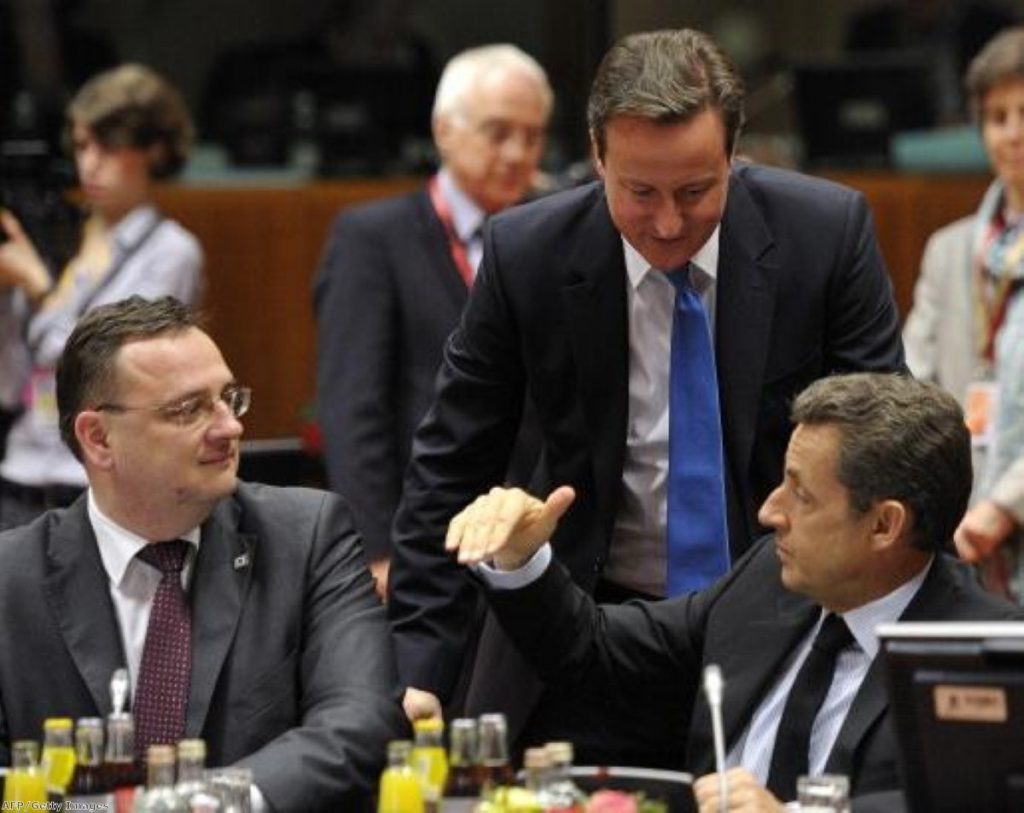UK ‘ready’ to offer extra cash for IMF’s euro bailouts
By Alex Stevenson
Britain could provide extra money to the IMF to help struggling EU countries but will not allow the money to bolster the eurozone's bailout fund, George Osborne has told MPs.
The chancellor's statement to MPs came after yesterday's Brussels summit, which agreed to boost the size of the European Financial Stability Fund (EFSF) to one trillion euros.
'Special-purpose vehicles' which will attract funds from investors have been identified as one way of achieving this.


Some fear the IMF, which Britain is heavily involved in, may provide money to contribute to the strengthening of the EFSF 'firewall'.
But in the Commons earlier Mr Osborne said he was not prepared to allow the IMF to pour its resources into the eurozone crisis.
"An active member of the IMF – yes. A supporter of the IMF helping with advice and technical support – yes," he told MPs.
"But the IMF contributing money to the eurozone bail-out fund – no. Britain contributing money to the eurozone bailout fund – no. That is Britain's clear position."
The chancellor said that Britain would be prepared to contribute extra resources to the IMF, however.
These funds could be allocated to specific struggling countries, rather than measures taken to assist the broader eurozone.
"Supporting countries that cannot help themselves is what the IMF exists to do," Mr Osborne added.
"There may well be a case for further increasing the resources to the IMF to keep pace with the size of the global economy. And Britain stands ready to consider the case for further resources and contribute with other countries if necessary."
The UK had criticised the 17 eurozone countries in the run-up to yesterday's emergency summit, prompting French president Nicolas Sarkozy to tell David Cameron at Sunday's meeting that the prime minister had missed a "good opportunity to shut up".
Mr Osborne suggested the force with which Britain had made its arguments had contributed to the air of urgency surrounding the summit.
"The eurozone leaders have grasped the seriousness of the situation – the pressure has paid off, in that respect," he told the Today programme.
In the Commons he added: "The deal put together is much better than was expected yesterday afternoon, but much detail remains unresolved.
"And having put pressure on the Eurozone to get this far, we have to keep up the pressure to get the details completed. They've started down the right road – now they have to finish the job."
Tense negotiations yesterday led to agreement in three key areas.
In addition to the EFSF agreement, eurozone states committed to recapitalising their banks by 106 billion euros by next summer, in a bid to ensure all have a nine per cent capital ratio.
Governments will have to fund the move if the money cannot be raised privately. The move will not affect Britain as all the UK's banks do not need additional capital.
Elsewhere, private investors accepted a 50% write-off of Greece's debts, allowing Athens to cut its debt to 120% of GDP by 2020. Eurozone states are contributing an extra 30 billion euros to assist Greece.
Speaking as he left Brussels yesterday, Mr Cameron had said "good progress" had been made.
The prime minister said the bank recapitalisation had not been "watered down" and insisted that "it's very much in Britain's interests that we sort out these problems and solve this crisis".
Markets responded positively to the news, with the euro performing better than it has since early September.
Analysts have suggested the eurozone deal will be sufficient to stave off a market collapse for several weeks, but many fear further steps will be needed to address the debt crisis by the new year.
Shadow chancellor Ed Balls said he was "cautiously positive" following the announcement of the deal.
"I think the most important thing in the markets today is that the European Central Bank has actually intervened and bought Spanish and Italian debt and that shows that the ECB is doing its job," he told Sky News.
"But fundamentally will there be the scale of financial backing for sovereign countries like Italy? We don't know. What will the actual details of this plan be? We don't really know. What is going to be the bank recapitalisation? We don't know. Will the European economy grow next year? That's really in doubt."

